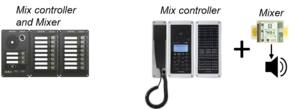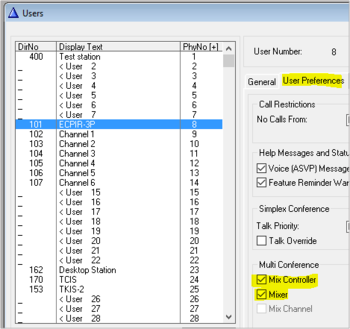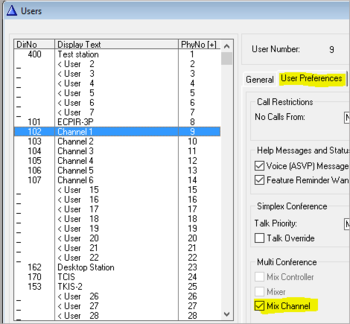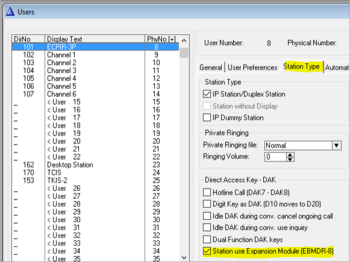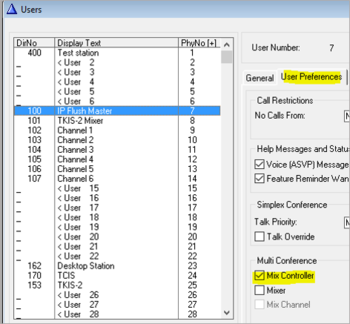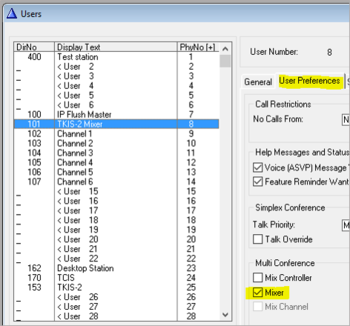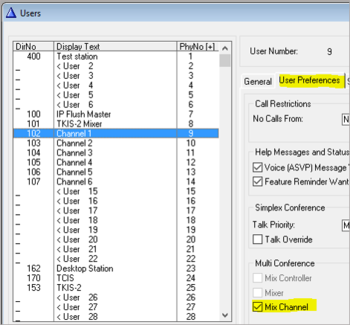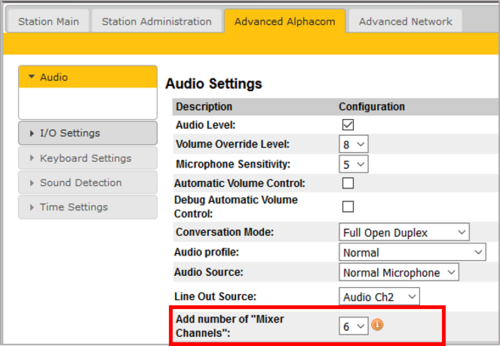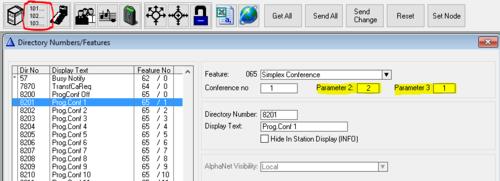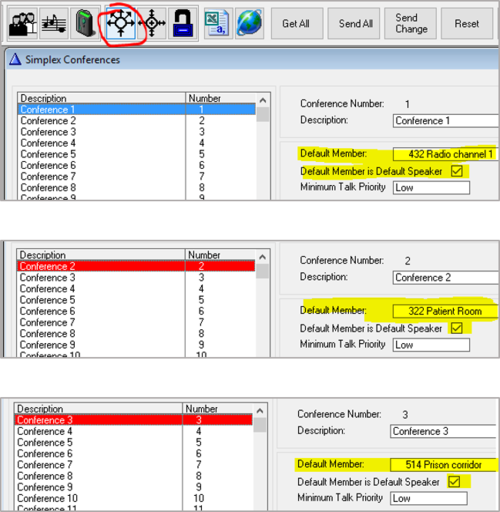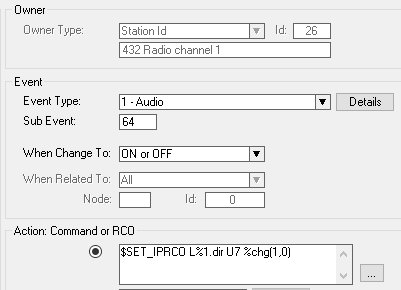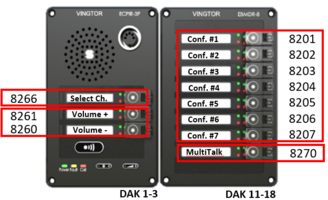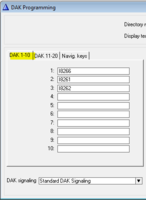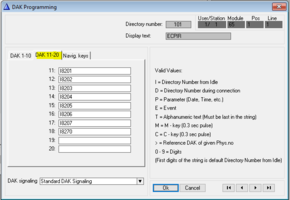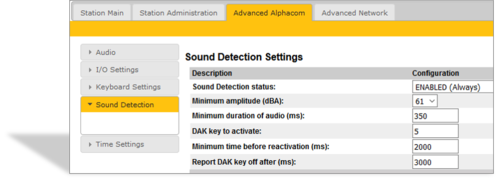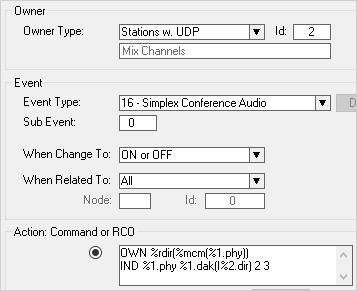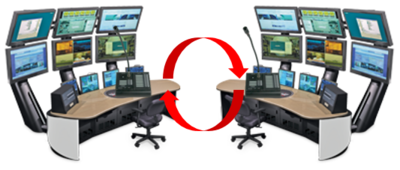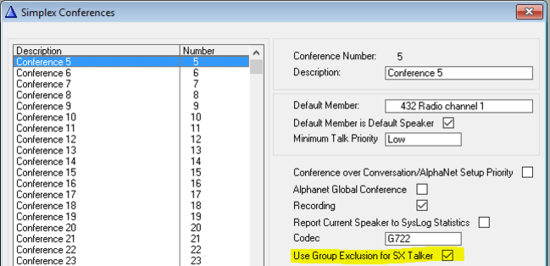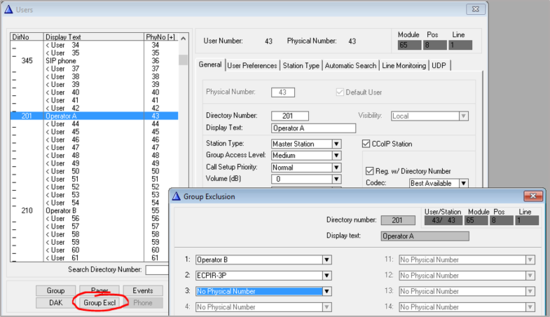Multiconference
From Zenitel Wiki
The MultiConference is an AlphaCom feature that makes it possible for operators to listen to multiple Audio Sources in a mix. The operator can talk back to individual sources, or to all sources in one go.
Typical Audio Sources are:
- Mobile Radio systems at:
- Industry plants
- Oil rigs
- Harbours
- Shopping malls
- Mobile Control Rooms
- Intercom stations in:
- Hospital - surveillance of patients
- Kindergarden
- Mental hospital
- Prisons
Principle of operation
Monitoring: An operator can listen to up to 6 different audio sources at the same time, from a pool of up to 50 audio sources.
LED indications: LEDs in the buttons on the operator panel shows what conferences are currently active. When there is voice activity on a conference channel, this can be indicated by a flashing LED.
Talkback: Talkback to an individual conference channel is done by pressing the corresponding DAK key. Talkback to all active conferences at the same time is made by pressing the PTT/M-key, or by pressing a preconfigured "Multitalk" DAK key.
Volume control: Each operator station have individual volume controls for:
- Each individual conference he is listening to
- The mixed output on the loudspeaker
- The mixed output on "Line Out" output (e.g. to external amplifier/speaker)
How the mixing works: The MultiConference is based on the Simplex Conference feature in AlphaCom. A Turbine device can receive audio from multiple Simplex Conferences, mix them and send the mixed signal out on the loudspeaker output. This is achieved by creating "Virtual stations" on the Turbine device. Each virtual station will register to the AlphaCom server as a regular station. Up to 6 virtual stations can be defined per Turbine device. From the operator station one can control which conference channels to listen to, and the conference will dynamically be assigned to a free virtual station.

|
The MultiConference feature is supported by IP devices only. Analog devices connected to ASLT ot ATLB-12 boards are not supported. |
Operator station
The operator station must have DAK keys with built-in LEDs to show current status. Suitable operator stations are:
- ECPIR panel with one or more EMBDR-8 expansion modules, or
- CRMV station in combination with a Turbine intercom device (mixer)
As an alternative it is possible to use Vingtor-Stentofon Operator in combination with SoftClient and a Turbine device as an operator control unit.
The mixing capabilities are available in Turbine devices only. The ECPIR panel is a Turbine device, so no additional hardware is required. As for the CRMV, it is based on the INCA platform, which doesn't have any mixing capablilties. When using CRMV as a operator station, one have to add a Turbine device (e.g. TKIS-2 or IP Speaker) for the mixing.
Audio Sources
There can be up to 50 different audio sources defined. Audio Sources are defined as Default Speaker in individual Simplex Conferences. Any IP Station device can be an Audio Source.
Software, hardware and license requirements
Software:
- AlphaCom: Software 12.3.3.2 or later
- AlphaPro: Version 11.6.3.11 or later
- Turbine: Version 4.7.3.0 or later
Hardware:
- The MultiConference feature is supported by IP devices only. Analog devices connected to ASLT ot ATLB-12 boards are not supported.
Licenses:
- Licenses: Each "virtual station" requires an IP Station license.
License examples:
- An ECPIR unit used for 6 channel mix requires 7 x IP Stations licenses. One for the ECPIR it self, and 6 for the virtual stations.
- A CRMV in combination with the TKIS-2 (mixer) will require 8 x IP Station licenses, and 1 x CRM-V DAK expansion license
Configuration
The Operator Station consists of 3 different elements which needs to be configured:
- 1: The Mix Controller
- 2: The Mixer
- 3: 1-6 Mixer Channels
The association between the elements is done by simply making certain that Mix controller, Mixer and Mixer Channels are assigned to subsequent physical numbers.
In AlphaPro the Mix Controller, Mixer and Mixer Channels must be defined on successive Physical Numbers and successive Directory Numbers.
ECPIR as operator station
- ECPIR configuration
CRMV as operator station
- CRMV configuration
Configure the Mixer and the Mixer Channels
The number of mixer channels to use is defined in the web interface of the Turbine device.
- Log in to the ECPIR panel (or to the Turbine device used in combination with the CRMV panel).
- The Directory number defined in Station Main > Main Settings function as the base number for the virtual stations. The "virtual stations" (Mixer channels) will use successive numbers.
- Select Advanced AlphaCom > Audio, and choose the number of "Mixer Channels". Each “Mixer channel” will register as a “station” in the AlphaCom, and consume one IP Station license.
E.g. if the station directory number is 101, and you define 6 mixer channels, the mixer channels will use directory numbers 102-107.
Set Simplex Conference properties
Simplex Conferences that are used for MultiConference, require some parameters to be modified.
In AlphaPro, select Directory & Features and scroll down to Simplex Conference (feature 65).
For each conference in use by the MultiConference feature, set:
- Parameter 2 = 2 (Talkback from DAK key)
- Parameter 3 = 1 (1 = Indicate active channel by Red LED. 2 = Green LED)
Define Audio Sources
Define a Default Speaker (= Audio Source) for each Simplex Conference in use.
In AlphaPro, select Simplex Conference button, and set the audio source as Default Member, and enable the Default Speaker flag:
Relay operation for Radio Interface
If the Audio Source is an interface to mobile radio (e.g. TKIE unit), there is a need to operate the relay of the TKIE when somewhone does talkback into the simplex conference. The relay is used to key the radio transmitter.
The following event (Audio event 1, subevent 64) is triggered when someone talks into the conference, and will trigger output 7 (= the relay) of the TKIE unit 432.
Action string:
$SET_IPRCO L%1.dir U7 %chg(1,0)
One have to create one such event for each TKIE unit.
Configuration of DAK keys
Directory numbers used by the MultiConference feature are included by default, you simply need to assign directory numbers to the DAK keys as wanted. The LEDs in the DAK buttons have a default operation, which can be altered.
The DAK keys are configured from AlphaPro, in Users & Stations > DAK window. Below is an example of DAK configuration on an ECPIR Panel:
- DAK configuration
To activate monitoring:
- Press Select Ch.
- Press Conf. #X to toggle monitoring On/Off
- Multiple conferences can be toggled On/Off
- Active conference indicated by red LED (programmable)
- 3 second dial timeout (programmable)
Talkback:
- To individual conference: Press the Conf. #X button
- To all active conferences: Press PTT button (M-key)
- Option: Press a MultiTalk DAK key
Volume:
- Volume can be adjusted on individual conferences channels.
- Press Volume +, then Conf. #X to adjust the volume up on this conference channel
- Press Volume -, then Conf. #X to adjust the volume down on this conference channel
- When both Red and Green LED are lit, you have reached maximum (or minimum) level
Note: Directory numbers are included by default as from AMC 12.3.3.2/AlphaPro 11.6.3.11. If you are using a database created in an earlier version, you need to define directory numbers manually. See Multiconference#Directory_Numbers_and_their_parameters.
Audio Activity Indication
When listening to multiple audio sources, it can be hard to hear which channel the audio is coming from. One can use LED indication in the DAK keys to show audio activity on a conference channel.
The audio indication can be tiggered by:
- The Sound Detection feature in Turbine, or
- An input (e.g. Squelch signal from a mobile radio)
Enable Sound Detection feature
To configure the Sound Detection, log on to the web interface of the Turbine station acting as Audio Source, and select Advanced Alphacom > Sound Detection.
Suggested parameters as follows:
This will trigger "DAK 5" whenever sound is detected on the line in.
For a detailed description of each parameter, see Sound Detection.
Note that the sound detection feature during conference is supported in Turbine devices with software 4.7 (or later) only. This feature is not supported in INCA devices.
Configure Audio Detection event
- In AlphaPro, Users & Stations, include all Audio Sources in a UDP group, say UDP 3
- In AlphaPro, Exchange & System > Events, Insert a new event with this UDP group as Owner, Event Type=30, SubEvent=5 (= DAK Key from Sound Detection)
Action command:
$VOX %chg(1,0) NC%sxc(%1.phy)
The $VOX command triggers the event "16 - Simplex Conference Audio" on all stations which are active members of the specified simplex conference.
In the configuration above, the event is triggered by DAK 5 (= SubEvent 5). If a squelsh signal is hardwired to an input of the Turbine device, change the Sub Event accordingly. (Sub Event 11-16 is used for input 1-6).
Configure LED indication event
- In AlphaPro, Users & Stations, include all Mix Channels in a UDP group, say UDP 2
- In AlphaPro, Exchange & System > Events, Insert a new event with this UDP group as Owner, Event Type=16
Action command:
OWN %rdir(%mcm(%1.phy)) IND %1.phy %1.dak(I%2.dir) 2 3
The above commands will cause the green LED in the corresponding DAK key to flash when audio is detected.
Prevent Acoustic feedback between operators
When operators are sitting close to each other, there is a risk for feedback when listening to same channel, and one of them is doing talkback to that channel. The operators may also experience annoying echo due to delay of VoIP audio.
By using the "Group Exclusion" feature, it is possible to prevent audio from being transmitted to nearby station(s) when an operator is doing talkback on the same channel as the neighbouring station is listening to.
- Feedback prevention by Group Exclusion
Directory Numbers and their parameters
Directory numbers for controling the Multiconference are included by default as from AMC 12.3.3.2/AlphaPro 11.6.3.11. If you are using a database created in an earlier version, you need to define the following directory numbers manually.
| Dir No | Description | Feature No | Param 1 | Param 2 | Param 3 |
| 8260 | Volume DOWN - Individual channel | 116 | 0 | 0 (*) | 2 (**) |
| 8261 | Volume UP - Individual channel | 116 | 1 | 0 (*) | 2 (**) |
| 8262 | Volume DOWN - Loudspeaker (mix) | 116 | 2 | 0 | 2 (**) |
| 8263 | Volume UP - Loudspeaker (mix) | 116 | 3 | 0 | 2 (**) |
| 8264 | Volume DOWN - Line Out (mix) | 116 | 4 | 0 | 2 (**) |
| 8265 | Volume UP - Line Out (mix) | 116 | 5 | 0 | 2 (**) |
| 8266 | Toggle Conference On/Off | 116 | 6 | 0 (*) | 2 (**) |
| 8270 | Multitalk - Talk back to all active channels | 119 | 0 | 0 | 0 |
(*) - Parameter 2 controls Dial Timeout (sec). Value 0 = default time 3 seconds.
(**) - Parameter 3 controls LED in DAK key:
- 0 = Off
- 1 = Steady red
- 2 = Steady green (Default)
- 3 = Slow red
- 4 = Slow green
- 5 = Fast red
- 6 = Fast green
Resources
- There are 50 Simplex Conferences in AlphaCom, which means it it possible to define up to 50 different Audio Sources
- Each active conference requires a “Fader resource”. The AMC-IP board has 12 faders, and each ASLT board has 2 faders.
- Each active conference require two “VoIP channels” out of the 64 available. So there can never be more than 32 active conferences at the same time, even if more faders are available.
Fader examples:
- AlphaCom XE1: Maximum 12 conferences can be active at the same time
- AlphaCom XE7/20/26 with 5 ASLT cards: Maximum 22 conferences (12 + 10 faders) can be active at the same time
Listen to more than 6 channels
It is possible to define two mixers for one Controller station, and in this way have 12-mix. However, Talkback is limited to the first 6 channels only, so when adding more than 6 mixers, the system will be suitable for monitoring only. If there is a requirement for more than 6-mix, please contact alphasupport@zenitel.com for further information.

